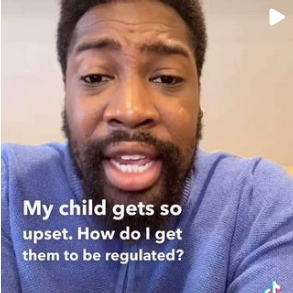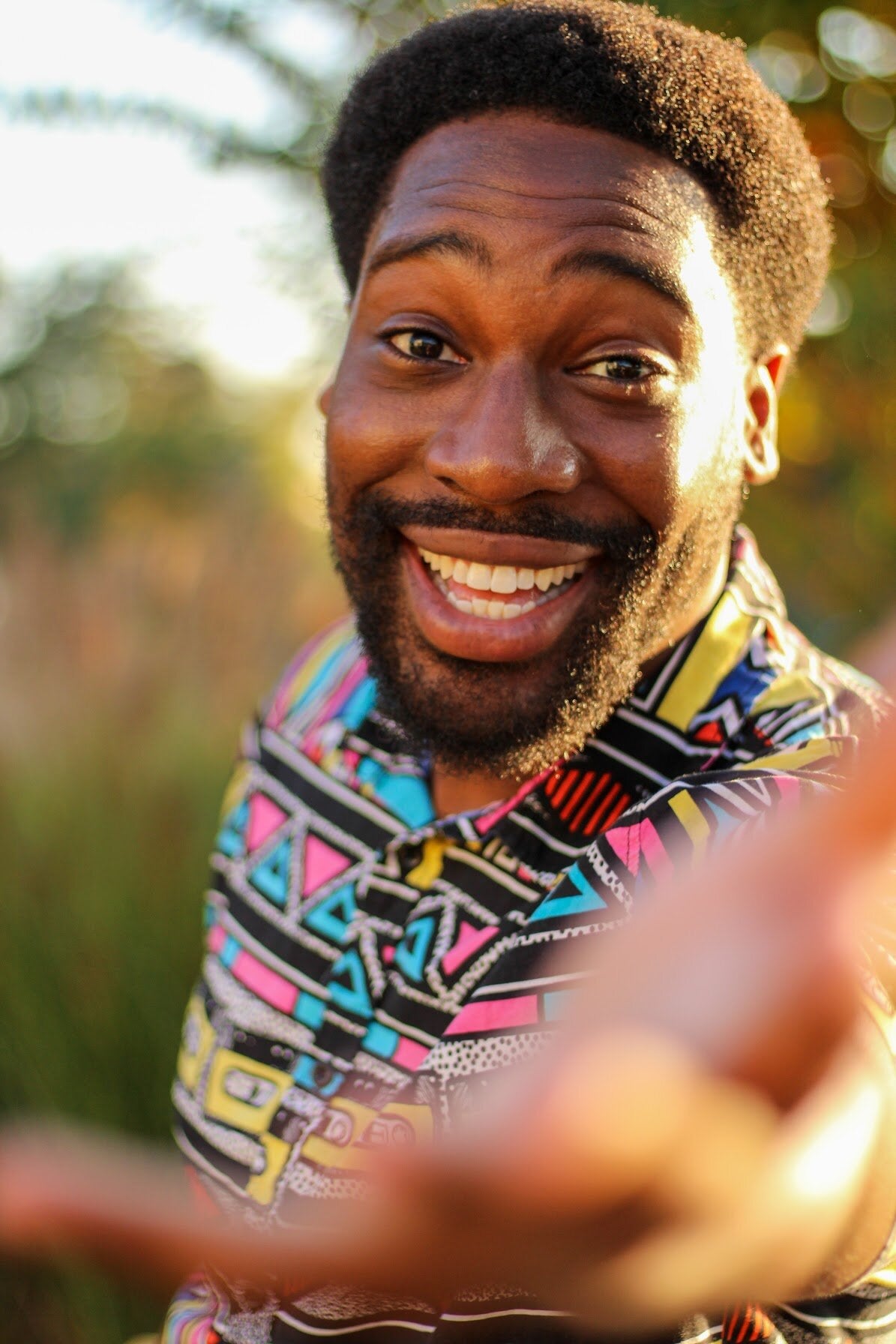I’ve been following Mr. Chazz for awhile now and I’m so impressed by the work he’s doing! I originally heard about Mr. Chazz through a friend who told me that I needed to check him out on Instagram and I quickly found that he and I share a common interest – we love finding healthy new ways to guide children through their growth and development.
I was going through all of his videos and my mind was literally blown. I saw so many behaviors he was pointing out that I was personally engaging in and, for me, that can feel scary because I pride myself on doing everything I can to protect the mental health of my children.
As a Licensed Family and Marriage Therapist, my primary initiative is to ‘do no harm’ and that concept is woven throughout my parenting style and skills. I’m constantly questioning, ‘How can I parent and discipline without creating some form of pathology?’ At first, I felt disappointed to see that there were some things Mr. Chazz was saying that I realized I was approaching in the wrong way with my own children, but then I reminded myself that it’s totally normal to feel that way – nobody is perfect! I took off my therapist hat, put on my mother hat, and reached out to Mr. Chazz so that I could learn more and talk to him about a few of the situations I face in my own home. His feedback was incredibly helpful and I hope you get just as much out of his thoughtful guidance as I have! For more like this, be sure to follow him on Instagram and check out Patreon.
Mr. Chazz — So many things throughout my life have inspired me to do the work I am doing now. Great and not-so-great teachers have inspired me. Great and not-so-great experiences have inspired me. Doing great and not-so-great things have inspired me. However, embarking on this not-so-clear path started when I became a Montessori teacher in a classroom of about 30 children.
Although more experienced professionals noticed that I had a natural “instinct” for working with children, I still really struggled in some areas. I was inspired by the nature of the work. How could I not be? I was growing the next generation of humans. I knew that the impact I was making on the children I was spending 8+ hours a day with was huge. This made it even more difficult for me to deal with not knowing how to handle conflict amongst them. I remember having this thought, “Am I ruining them? Am I making things worse when I try to help?” It was REALLY stressful. In fact, I remember going on my break, sitting in my car, and trying to fight back tears from the stress. I was fighting the tears because, even in the solitude of my car, the message many of us receive was still hard wired into my subconscious: “Don’t show emotions. Don’t be weak.” Ironically, this subconscious belief I had was a part of the problem. I remember my body not wanting to walk back into that building. However, I cried it out, wiped my tears and walked back in. And I’m glad I did.
Over time, with a lot of training, mentorship, reflection, books, podcasts, research, practice, and a mindset of continuous improvement, I became really confident working with children. Other teachers noticed that I was able to successfully work with several children who were seen as challenges and they started to ask for advice, casually in the break room. They would come back the next day exclaiming, “Your advice made SUCH A DIFFERENCE for me and the child.” I loved the impact I had on my own community of little humans as a teacher but that’s when I realized that my impact could be exponential if I worked with teachers. Soon after, I became an Educational Specialist and my job was to basically teach other teachers how to teach. I became largely responsible for the classrooms of 8 different schools with children as young as 3 weeks and as old as 12 years.
Have you ever seen Scandal? I always say that I was like the Olivia Pope of classrooms! Whenever there was a challenge in a classroom, they would call me. I would have to assess the situation and work with teachers/directors/students to figure out how to move forward with success. I did that for 6 years and then the pandemic hit. Most of the teachers and children went home. I still had this strong intrinsic desire to help people enjoy the process of growth but I had no outlet for this pursuit.
My grandfather passed away due to Covid and I decided to quarantine with most of the world. I still had this purpose itch that I needed to scratch centered around helping people enjoy the process of growth, and that’s when I got on Tiktok. Through Tiktok, I saw two things:
1. I saw how parents were struggling with their children at home.
2. I saw people educating others in an authentic, enjoyable and impactful way.
That’s when the light bulb went off that I could do the same! There were so many challenges parents were sharing and I knew I had a lot of experience and knowledge that could help. My goal was (and still is) to create content that was enjoyable to consume and valuable for learning. I envision a world where adults can truly see, guide and trust children.

Follow Mr. Chazz on TikTok for more like this!
NW — You discuss self-regulation, co-regulation, and dysregulation a lot. Can you explain their importance and how they contribute to behavior and parent-child interactions?
Mr. Chazz — I like to describe regulation in terms of balance. Self-regulation is bringing yourself back into balance, co-regulation is one person helping another person get back into balance, and dysregulation is out of balance. All three are an essential and healthy part of the human experience.
Children get dysregulated often and this can present challenges for adults who care for them. A child may get dysregulated when they have unmet needs or when a puzzle piece does not fit. Often, a child may scream or throw something when dysregulated. As a result, dysregulation may spread to the adult. Then the adult may respond to the child by yelling, shaming or even hitting. The adult may think they are doing something positive for the child because they are trying to stop the behavior. However, what is really happening is that the adult is dysregulating the child even further. The child is learning to be more reactive instead of learning to self-regulate.
The importance is this: children (brain and bodies) learn to self-regulate when adults are able to co-regulate with them. However, adults are not able to co-regulate if they aren’t regulated first. If an adult cannot self-regulate so they can engage in co-regulation, then there will be never ending cycles of dysregulation.
Let me put it in simpler terms without using jargon. Child gets mad. Adult gets mad. Adult cannot calm. Adult projects their mad back onto the child and the child does not practice bringing themselves back to calm. The child grows up to be an adult who has not mastered or even practiced this skill. Then they have children and the cycles continues.
NW — I’m interested to hear your thoughts on high energy children. How do you know when you have a high energy child and what can you do to provide positive guidance when you’re feeling frustrated?
Mr. Chazz — When I think about energy with children, I always think about an Anime called, “Avatar: The Last Airbender.” Stay with me here, I’ll give the quick tip at the end of this answer. In this show they, “bend” the elements of fire, water, earth, and air. They do not create these elements, they can only manipulate the elements that are already present. That’s how I think about energy in children. We can’t create or destroy the energy of children (if we do, that has its own set of consequences). We can only guide them in using their different kinds of energy. Here is where the quick tip comes in.
Tell children what to do instead of what not to do. If a child is running around the house in an unsafe way, we can redirect them to use their energy in a safer way (obstacle course, climbing up the stairs, dance party, etc). This also applies to older children who have a lot of creative energy. Facilitate the pursuit of a child’s interests.
NW — If you could distill your lessons into 3 or 4 reminders parents should revisit each morning before engaging with their children, what would those be?
Mr. Chazz – “Don’t be a Perfectionist, be an Improvenist. The goal isn’t to be perfect every day. The goal is to improve a little every day.” – Mr. Chazz
“Young children intuitively know everything they need to do for their bodies and brains to grow. They just need help from adults to figure out where and how to do things appropriately, in this world we have created.” – Mr. Chazz
And I have no idea who came up with this last quote but it’s a mantra I use for myself: “The child isn’t giving you a hard time, they’re having a hard time.” – Unknown
NW – Can you tell us more about Patreon and how it’s creating a community where parents and teachers can ‘SEE, GUIDE and build TRUST’ with children?
Mr. Chazz – In my pursuit to help parents and teachers understand children, guide children and trust children, I have created a Patreon community. Every week, I bring on a different professional to answer questions from my community. These Q&A sessions help parents and teachers fill in the gaps of knowledge we all have because no one is an expert in everything. We also brainstorm ways parents and teachers can respond to different situations and behaviors that are reoccurring. Over time, parents and teachers begin to trust the process. They trust that they know how to respond to various situations. They trust their children to make mistakes. They trust the learning process of their children and can be a more helpful participant in it. The feeling of trust begins to douse the forest fire of fear that pushes us to try to have unnecessary control over children. That fear can be the catalyst for self-fulfilling prophecies that make our fears more likely to come true. Through Patreon, we have weekly Q&A sessions, monthly virtual parent meet ups, and access to 1-on-1 coaching with me. The Patreon Community is an immersive experience with the capacity to help parents and teachers break toxic cycles that may have been passed down in families for centuries. You can gain access to the tier level that best meets your needs at www.patreon.com/mrchazz.

